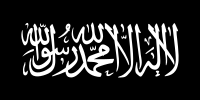
Back حركة الاتحاد الإسلامي Arabic حركة الاتحاد الاسلامى ARZ Al-Itihhad al-Islamiya Catalan Al-Ittihad al-Islami German Al-Ittihad al-Islami French Al-Itihaad al-Islamiya Portuguese Islamisk enighet Swedish อัล-อิจญ์ติฮาด อัล-อิสลามียะห์ Thai
| Al-Itihaad al-Islamiya | |
|---|---|
| الاتحاد الإسلامي | |
 | |
| Founder | Sheikh Ali Warsame[1][2] |
| Leaders | Sheikh Ali Warsame (1983-1992)[1][3] Sheikh Abdullahi Bade[4] Abdulsalam Osman[5] Hassan Dahir Aweys Hassan Turki |
| Dates of operation | 1983[6]–1997 |
| Merger of | Wahdat al-Shabaab (Islamic Unity Youth) and Jama'at al-Islamiya (Islamic Group) |
| Split to | Jama'at al-I'tisam |
| Headquarters | Luuq |
| Active regions | Gedo Region, Somalia and Somali Region, Ethiopia |
| Opponents | |
Al-Itihaad al-Islamiya (AIAI; Arabic: الاتحاد الإسلامي, lit. 'The Islamic Union') was an Islamist politico-military group in Somalia. Formed in 1983 through a merger of smaller Islamist groups, the organization was the most powerful Islamic movement in the country during the late 80s and early 90s. It also had the most widespread clan following of all the Islamist factions across the nation[7] and professed the aim of creating a Somali Islamic state.[8]
In response to the collapse of the Somali Democratic Republic during 1991, the organization militarized and became involved in several wars with foreign troops and Somali factions.[7] After internal disputes over policy and several military defeats in the late 1990s, AIAI renounced the use of violence and effectively disintegrated in 1997 into other political entities.[9]
- ^ a b Rabasa, Angel (13 January 2009). Radical Islam in East Africa. Rand Corporation. ISBN 978-0-8330-4679-6.
- ^ Hutzley, Jonathan D. (2007). Unmasking Terror: A Global Review of Terrorist Activities. Jamestown Foundation. ISBN 978-0-9675009-6-6.
- ^ Hutzley, Jonathan D. (2007). Unmasking Terror: A Global Review of Terrorist Activities. Jamestown Foundation. ISBN 978-0-9675009-6-6.
- ^ Abdi 2021, p. 150: "Sheikh Abdullahi Bade and Sheikh Abdullahi Sheikh Ahmed Qasim were elected chairman and vice-chairman, respectively.'"
- ^ Abdi 2021, p. 192: "The organizations members quickly regrouped and elected Sheikh Abdulsalam Osman Abdulsalam as the new leader to replace Sheikh Abdullahi Bade.'"
- ^ Abdi 2021, p. 149-150.
- ^ a b Elmi 2010, p. 58-59.
- ^ Elmi 2010, p. 77-78.
- ^ Elmi 2010, p. 70-71.